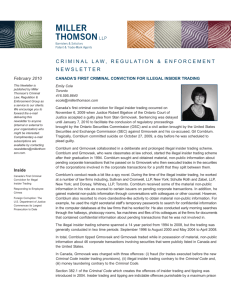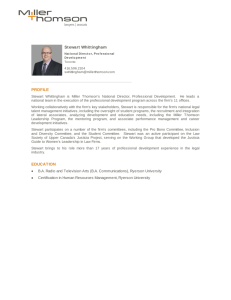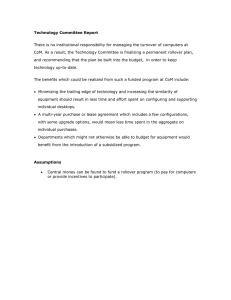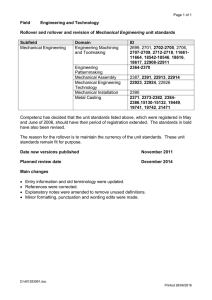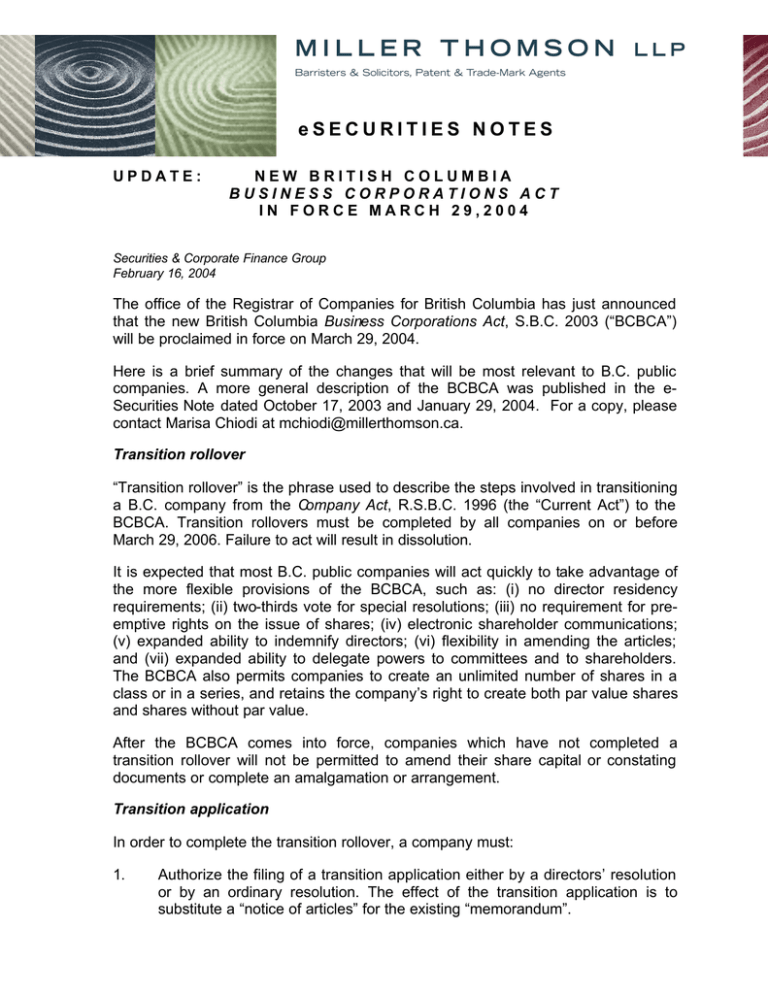
MILLER THOMSON LLP
Barristers & Solicitors, Patent & Trade-Mark Agents
eSECURITIES NOTES
UPDATE:
NEW BRITISH COLUMBIA
BUSINESS CORPORATIONS ACT
IN FORCE MARCH 29,2004
Securities & Corporate Finance Group
February 16, 2004
The office of the Registrar of Companies for British Columbia has just announced
that the new British Columbia Business Corporations Act, S.B.C. 2003 (“BCBCA”)
will be proclaimed in force on March 29, 2004.
Here is a brief summary of the changes that will be most relevant to B.C. public
companies. A more general description of the BCBCA was published in the eSecurities Note dated October 17, 2003 and January 29, 2004. For a copy, please
contact Marisa Chiodi at mchiodi@millerthomson.ca.
Transition rollover
“Transition rollover” is the phrase used to describe the steps involved in transitioning
a B.C. company from the Company Act, R.S.B.C. 1996 (the “Current Act”) to the
BCBCA. Transition rollovers must be completed by all companies on or before
March 29, 2006. Failure to act will result in dissolution.
It is expected that most B.C. public companies will act quickly to take advantage of
the more flexible provisions of the BCBCA, such as: (i) no director residency
requirements; (ii) two-thirds vote for special resolutions; (iii) no requirement for preemptive rights on the issue of shares; (iv) electronic shareholder communications;
(v) expanded ability to indemnify directors; (vi) flexibility in amending the articles;
and (vii) expanded ability to delegate powers to committees and to shareholders.
The BCBCA also permits companies to create an unlimited number of shares in a
class or in a series, and retains the company’s right to create both par value shares
and shares without par value.
After the BCBCA comes into force, companies which have not completed a
transition rollover will not be permitted to amend their share capital or constating
documents or complete an amalgamation or arrangement.
Transition application
In order to complete the transition rollover, a company must:
1.
Authorize the filing of a transition application either by a directors’ resolution
or by an ordinary resolution. The effect of the transition application is to
substitute a “notice of articles” for the existing “memorandum”.
2.
“Rollover” the articles to ensure that they comply with the BCBCA. Again, a
directors’ resolution or an ordinary resolution must be passed to authorize the
mandatory alterations to the articles, and the resolution must be deposited at
the company’s records office before filing the transition application. In
addition, any provisions which were contained in the memorandum but which
will not be carried forward in the notice of articles must be included in the
articles and revisions must be made to remove any information which is
inconsistent with the notice of articles contained in the transition application.
In addition to the mandatory changes, companies can also make optional alterations
to the articles in order to update the terminology and take full advantage of the
flexibility permitted under the BCBCA. Optional alterations to the articles must be
approved by a special resolution.
The transition rollover is effective when the transition application is filed with the
Registrar of Companies. The articles are no longer filed with the Registrar of
Companies, as they are under the Current Act, but are maintained at the records
office only. Amendments to the constating documents resulting from the mandatory
transition rollover will not be a breach of a security agreement.
When a company completes its transition rollover, it will automatically be subject to
the Pre-Existing Company Provisions (“PCPs”) in a prescribed form. These include
certain matters such as pre-emptive rights on the issue of new shares and pro rata
redemptions of shares that are obligatory under the Current Act but that are optional
under the BCBCA. Once the transition is complete the PCPs can be amended in the
same way that any other provisions of the articles can be amended.
Share certificates
Most share certificates of public companies will contain terms that are not used in
the BCBCA and it is recommended that share certificates be updated at the same
time as the transition application is filed with the Registrar of Companies.
Reporting companies
The requirements applicable to reporting companies in the Current Act, such as
proxies, information circulars, interim and comparative financial statements and
directors have not been carried over under the BCBCA.
It is intended that these matters will be covered by applicable securities legislation
thereby avoiding duplication and inconsistencies within the regulatory requirements.
This will apply to the vast majority of public companies. However, certain reporting
companies under the Current Act which are not otherwise covered by Canadian
securities legislation (that is, are not reporting issuers in a Canadian province or
territory) are designated as “pre-existing reporting companies” under the BCBCA
and will automatically be subject to Statutory Reporting Company Provisions
(“SRCPs”) in a prescribed form.
2
When a pre-existing reporting company completes its transition rollover, it must alter
its articles to include the SRCPs. Once the SRCPs have been included in the
articles, they can be amended in the same way that any other provisions of the
articles can be amended.
Records
The BCBCA requires that all companies must maintain a central securities register
(in place of the registers of members, allotments and transfers). This requirement is
effective on the date the BCBCA comes into force.
The BCBCA will require certain additional records that must be kept at the records
office which includes consents to act as directors, resignations of directors, copies of
court orders, etc. The records office must maintain certain historical records which
are required under the Current Act which relate to the period before the BCBCA
comes into force. In addition, the pre-existing company must maintain a record of the
shares of the company that were held by shareholders on the date the BCBCA
comes into force.
If you have any questions on transition rollovers of public companies, please contact
Greg Smith at 604.643.1258 or by email at gsmith@millerthomson.ca. Greg has
extensive experience in advising public companies on all aspects of corporate
finance and corporate governance. If you have any other questions on the new
legislation, please contact Martin MacLachlan at 604.643.1223 or by email at
mmaclachlan@millerthomson.ca. Martin is a member of the committee of lawyers
advising the government on the legislation. He is on the editorial board of the new
edition of the B.C. Company Law Practice Manual which has just been published
and is completely revised to reflect the new legislation. He has also presented a
number of papers on the new legislation to the legal profession and the Vancouver
business community.
Members of the Miller Thomson LLP Securities & Corporate Finance Group regularly
advise issuers and registrants with their corporate governance, disclosure and
compliance matters. We would be pleased to assist you with any needs you may
have in this regard.
Martin MacLachlan
Tel: 604.643.1223
Email: mmaclachlan@millerthomson.ca
Gregory Smith
Tel: 604.643.1258
Email: gsmith@millerthomson.ca
3
IN TORONTO:
2500, 20 Queen Street W.
Toronto, ON M5H 3S1
Tel: 416. 595.8500
Fax: 416.595.8695
Barbara R.C. Doherty
David N. Ellison
*Karima Kanani
David A. Knight
Eli I. Laius
S. Brian Levett
Robert M. Stewart
Steven L. Wesfield
IN VANCOUVER :
840 Howe Street, Suite 1000
Vancouver, BC V6Z 2M1
Tel: 604.687.2242
Fax: 604.643.1200
416.595.8621
bdoherty@millerthomson.ca
416.595.8594
dellison@millerthomson.ca
416.595.7908
kkanani@millerthomson.ca
416.597.4360
dknight@millerthomson.ca
416.597.4370
elaius@millerthomson.ca
416.595.8167
blevett@millerthomson.ca
416.595.2963
rstewart@millerthomson.ca
416.595.8606
swesfield@millerthomson.ca
Dwight D. Dee
Corrine M. Fiesel
S. Campbell Fitch
Martin L. MacLachlan
Peter J. McArthur
Gregory C. Smith
Ronald H. Stewart
Larissa M. Streu
604.643.1239
ddee@millerthomson.ca
604.643.1251
cfiesel@millerthomson.ca
604.643.1206
cfitch@millerthomson.ca
604.643.1223
mmaclachlan@millerthomson.ca
604.643.1219
mcarthur@millerthomson.ca
604.643.1258
gsmith@millerthomson.ca
604.643.1201
rhstewart@millerthomson.ca
604.643.1246
lstreu@millerthomson.ca
* Called to the Bar in the State of Massachusetts
IN CALGARY :
3000, 700-9th Avenue SW
Calgary, AB T2P 3V4
Tel: 403.298.2400
Fax: 403.262.0007
Clarke D. Barnes
Natalie M. Fenez
Michael F. Hayduk, Q.C.
Debra J. Poon
Greg P. Shannon
Paul A. Verriour
IN W ATERLOO – W E LLINGTON:
700, 22 Frederick Street
Kitchener, ON N2G 4A2
Tel: 519.579.3660
Fax: 519.743.2540
403.298.2402
cbarnes@millerthomson.ca
403.298.2425
nfenez@millerthomson.ca
403.298.2410
mhayduk@millerthomson.ca
403.298.2020
dpoon@millerthomson.ca
403.298.2482
gshannon@millerthomson.ca
403.298.2430
pverriour@millerthomson.ca
Eric N. Schneider
Robert L. Warren
Ian C. Wismer
519.579.3661 Ext. 300
eschneider@millerthomson.ca
519.579.3661 Ext. 345
rwarren@millerthomson.ca
519.579.3661 Ext. 351
iwismer@millerthomson.ca
This document is provided as an information service to our clients and is a summary of current legal developments. This article
is not meant as a legal opinion and readers are cautioned not to act on information provided in this document without seeking
specific legal advice with respect to their unique circumstances. Miller Thomson LLP uses your contact information to send you
information on legal topics that may be of interest to you. It does not share your personal information outside the firm, except
with subcontractors who have agreed to abide by its privacy policy and other rules.
If you wish to correct or change your email address, please contact Marisa Chiodi by phone at 416.595.8573 or by email at
mchiodi@millerthomson.ca.
Visit our website: www.millerthomson.com
© Miller Thomson LLP 2004- All Rights Reserved
4


